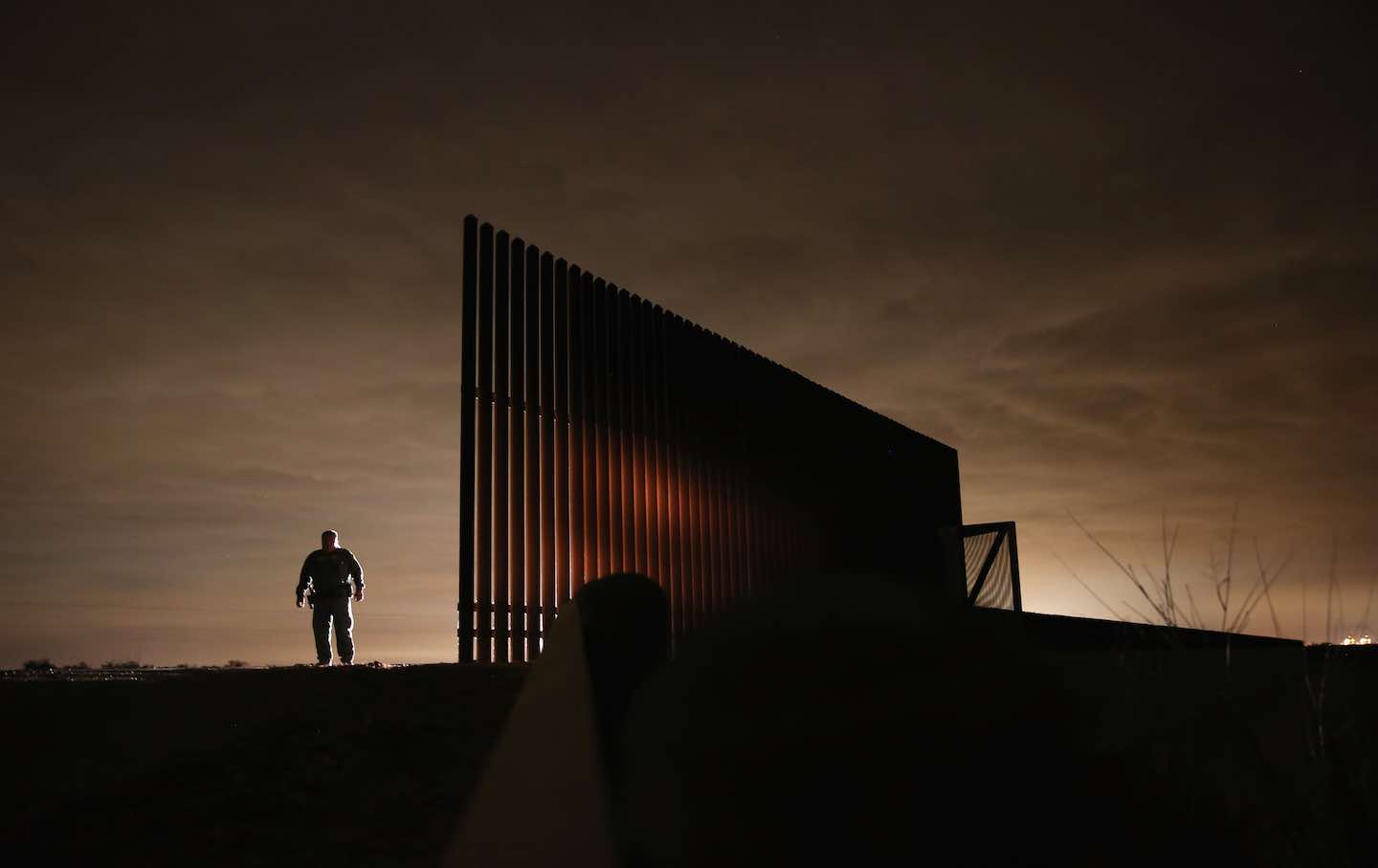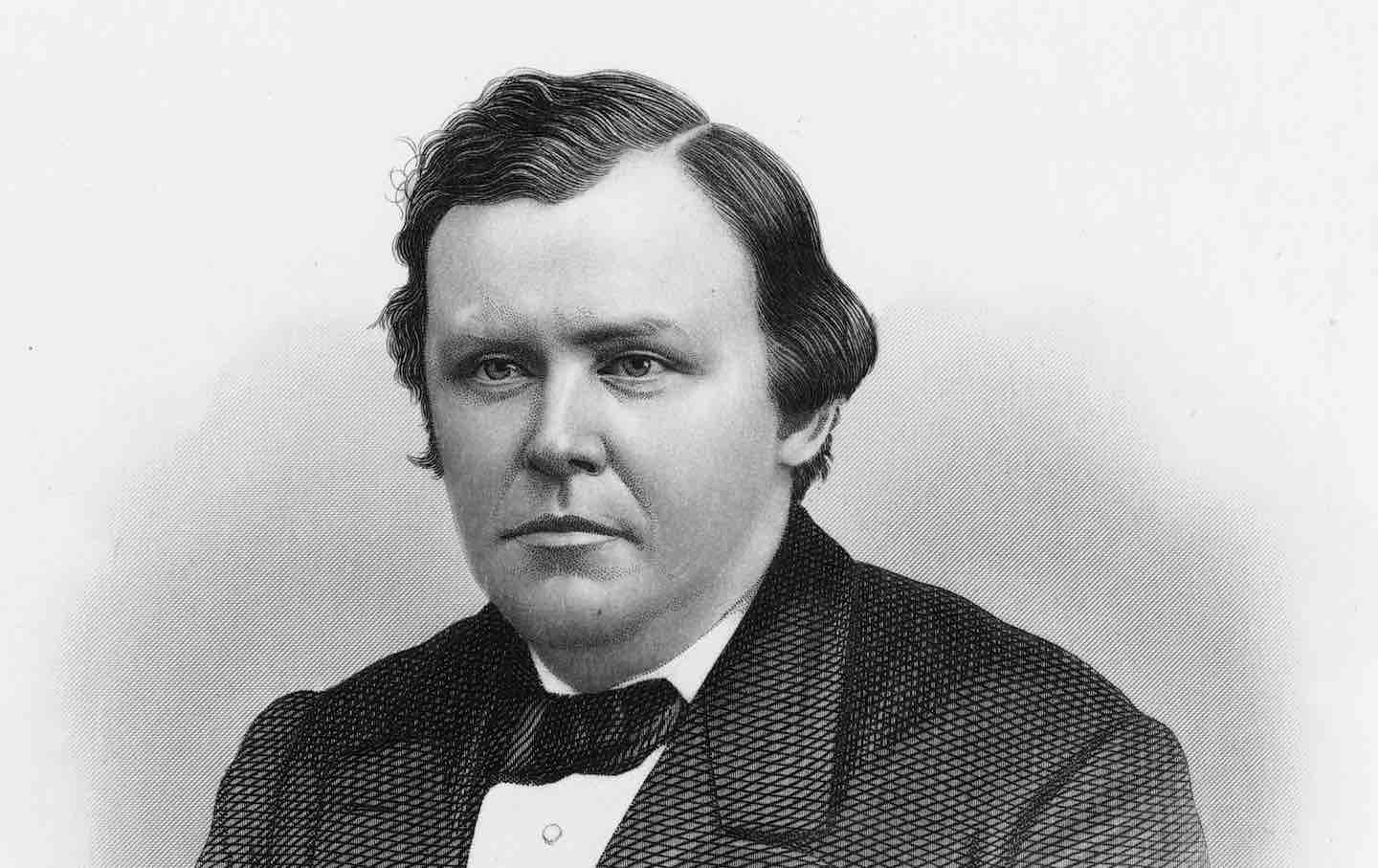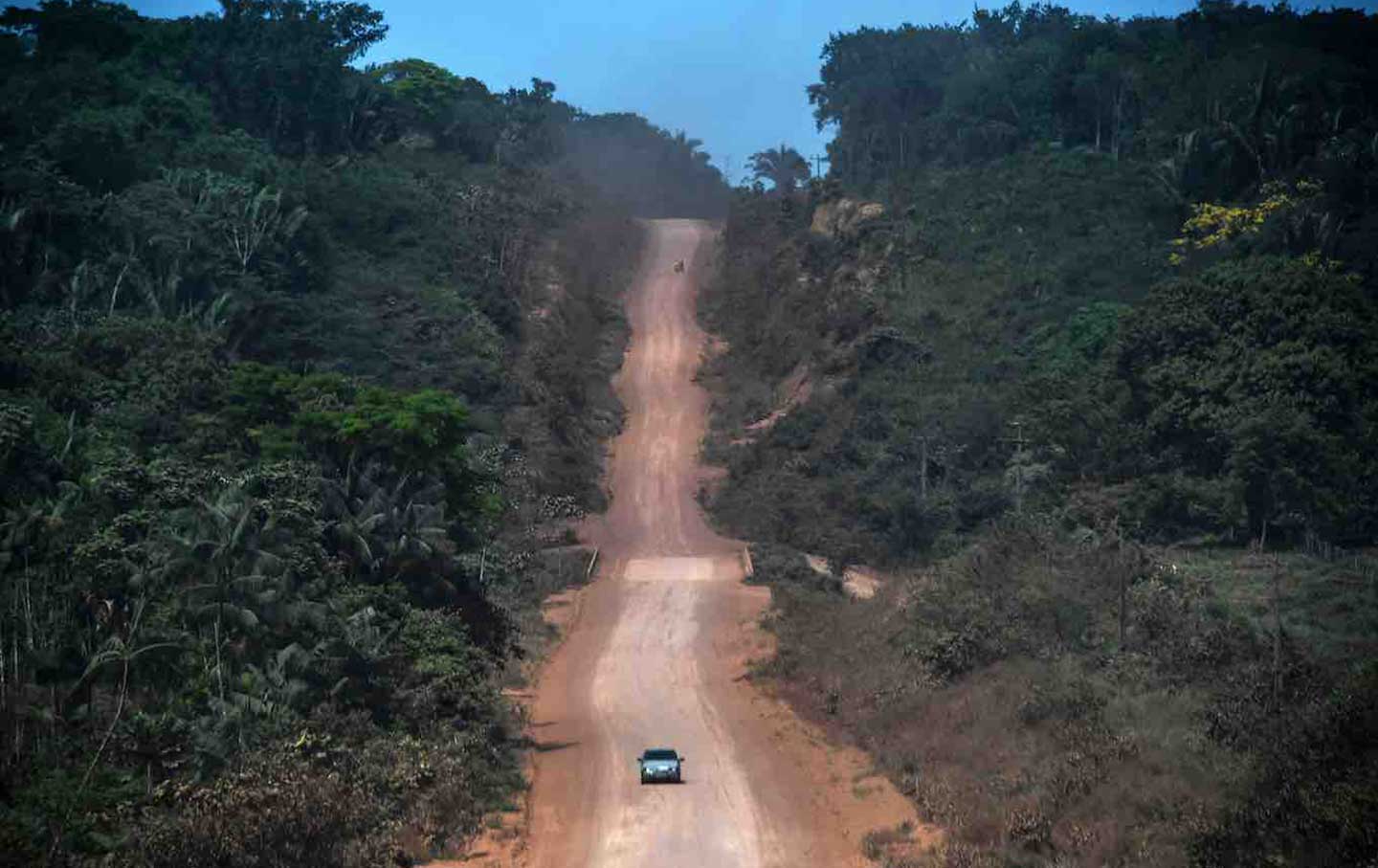The Indefensible Job of Policing the Border
Against the Wall, a former border officer’s memoir, argues that when it comes to protecting the border, cruelty is the point.

A US border patrol agent on patrol near La Joya, Tex., 2013.
(Photo by John Moore / Getty Images)In the summer of 2021, I sat in on a presentation given by two members of the US Border Patrol’s Missing Migrants Program—a small initiative of the agency to devote resources to identifying the recovered remains of deceased migrants—to a group of college students on a trip to learn more about the US-Mexico border.
Books in review
Against the Wall: My Journey from Border Patrol Agent to Immigrant Rights Activist
Buy this bookThe presentation took place at the South Texas Human Rights Center in Falfurrias, a town of 5,000 long considered the epicenter of migrant death in the state, despite being 75 miles north of the border. The reason for the deaths is that the town is the site of a major Border Patrol checkpoint that migrants must circumvent on foot; many lose their lives in the hot, immense shrubland of the local ranches.
The agents, one male and one female, explained that their office aimed to identify the remains using the FBI’s DNA database and by rehydrating the fingers of deceased migrants in order to take prints. This effort, they stressed, was tied to both humanitarian responsibility and a need for border enforcement. “No one deserves to die in this manner,” one agent said. “For whatever reason they’re coming to this country illegally, their families deserve closure.”
After the agents’ presentation, one student asked whether racism was a problem within the office’s ranks. The female agent replied that because more than half the agents were Latino, like most migrants, there was no issue with racism. She shared that she herself had immigrated to the United States from Mexico as a child, but had done so legally, and had waited years to become a citizen.
Then, Eddie Canales, the director of the South Texas Human Rights Center, asked what the agents thought should be done about the fact that the Border Patrol had no outside oversight when it came to wrongdoing by its agents. The agent said that the Border Patrol handled those cases internally. Canales pushed further, referencing the many cases of excessive force and fatal shootings that activists have documented.
The agent repeated the bit about cases being handled internally again and again; Canales insisted on the need for external oversight, since the discipline meted out by the Border Patrol was virtually nonexistent. Neither let up, until finally the agent broke down crying. The event ended awkwardly. As it did, the two agents asked Canales to step outside with them and told him that his question had been out of line.
For weeks afterward, the scene perplexed me. The agents had given a canned presentation about their humanitarian efforts; how could they not think to prepare for questions about the agency’s oversight? It did not make sense to me that the agent had taken a critique of the Border Patrol so personally.
Against the Wall helped me better understand the charged moment and, by extension, the Border Patrol’s power over its agents. A memoir by Jenn Budd, who served as a Border Patrol agent in southeastern San Diego County, Calif., from 1995 to 2001, the book chronicles how the agency’s mandate to police—and commit violence against—migrants carries with it the possibility of a psychological toll. “When you’re an oppressor, you have to pay the price,” said Budd at a presentation in Mexico City in the fall of 2022. “You bring it home to your families, you bring it to church, you bring it to your social circles.”
A survivor of child abuse, Budd entered the Border Patrol accustomed to ignoring her emotions and compartmentalizing the cost of witnessing or inflicting violence. But the agency pushed these ingrained tendencies to a breaking point, bringing her to a reckoning that resulted in both a personal and a political transformation.
Throughout the memoir, Budd describes this process through the metaphor of breaking down walls. “Another thing about walls: they are temporary. They cannot last, no matter what material they are made of,” she writes. “Mental walls are no different and require constant repair and rebuilding. Whatever you hide on the other side will eventually find its way through.”
The image comes so readily as to feel somewhat predictable. But the authenticity of Budd’s account more than makes up for these occasional forays into platitude: Against the Wall is an invaluable primary source for understanding the rise of hard-line border enforcement in the United States. Reading it feels like gaining access to the first declassified documents of an important archive. Budd allows us to look into the workings of our country’s border policy on an intimate level—and to see how an ideology can, in turn, create pain and wreckage in the lives of those charged with enforcing it.
As Against the Wall tells the story, Budd joins the Border Patrol in 1995 as a college-educated, closeted white girl from Alabama with an earnest belief in law enforcement. (In 1999, after coming out, she became the first Border Patrol agent to march in uniform at the San Diego Pride Parade.) She advances to become a senior agent and then a senior intelligence agent. But over time, her faith in the agency crumbles as she comes to understand its systemic sexual harassment, its internal condoning of misconduct, and its disregard for the rights that migrants are supposed to have under US law.
Popular
“swipe left below to view more authors”Swipe →These realizations start early on. Just weeks into her training, a fellow cadet rapes her. She doesn’t report it, because she’s already been warned of what happens to women who do. Cadets aren’t allowed to call the police, so the only avenue available is an internal complaint filed with the Equal Employment Opportunity Commission. But if she files one, she’ll be punished by the very superiors who are supposed to redress the crime. It’s a lose-lose situation: They find out about the rape anyway and blame her for slandering her rapist, even though she never filed a complaint.
Soon after, Budd starts to see that the misconduct in the agency goes beyond sexual harassment. Arriving on scene one night to find that a fellow agent has shot at migrants who had run back into Mexico, she watches the Border Patrol’s Critical Incident Investigative Team throw rocks at the agent’s truck windows, so that it will appear that he had acted in self-defense.
But what really breaks Budd is the experience of being complicit in migrant death. While temporarily stationed in Indio, Calif., she and the other agents on duty climb the access ladders of slow-moving freight trains as they pass through, forcing any migrants who have hidden themselves inside the cars to jump out. One day, a group of seven runs east from the tracks and is apprehended by Budd’s coworker, who followed them in a truck. He radios Budd to tell her that they say they’re too tired to run back to the station. “Get them doggies running!” she calls back. Her shift ends, and later that night, the coworker joins her at the bar of the motel where they are staying. “They died,” he tells her—all seven of them. Though Budd and her coworker avoid showing emotion to one another, it haunts them both. In the days and weeks that follow, the coworker gets drunk every night; Budd has to drag him to the truck to go to work, where he sleeps off his hangover on the job. For Budd, meanwhile, the event is the last straw in her loss of faith in the agency.
With no energy left to expend justifying what she sees, she leaves the Border Patrol and takes an entry-level job at her partner’s cabinet-making business in San Diego. But she can’t shake off her time in the agency. She feels caught between missing the sense of purpose it gave her and wanting the Border Patrol to own up to its misdeeds. She makes a suicide attempt in her partner’s woodshop. She’s not the only one to have done so: She recalls how a coworker named Dave “drank himself crazy and set himself on fire,” how another “[blew] his brains out with his service weapon,” and how a third “sat in the carpool parking lot along I-8 and took a bottle of pills.” The agency pushed them to their breaking point before they could articulate what felt so wrong.
Budd barely survives: Her partner finds her when she comes to work the following morning, and an ambulance takes her to the hospital. (She still does not have the full use of her hands and arms, which she damaged severely while using the tools to sever her radial arteries.)
During the long process of recovery, she connects her childhood memories of being physically abused by her mother with her experience as a Border Patrol agent. Seeing the resonance between the two forms of violence is what finally enables her to piece together the confusing feelings that pushed her out of the agency. “My childhood abuse led to poor decisions like joining the Border Patrol and ignoring all the signs, all the red flags that were plain as day,” she writes. “The systemic abuse the agency dished out towards female agents that I suffered was frankly normal for me.”
This also forms the book’s key conceptual point: that when you learn to rationalize interpersonal abuse, it’s not a leap to justify—and participate in—state violence. Yet she finally understands that, just as there was no justification for her to have been raped by another agent, there was no justification for her mother to beat her, there is no justification for agents to deprive migrants of their basic human and legal rights, either. But facing this truth requires Budd to relearn even the fundamentals of how to live in the world.
The scene I witnessed at the South Texas Human Rights Center in Falfurrias made me indignant. It felt like a show put on to prove that Border Patrol agents were righteous. But even more, it confused me. I didn’t understand why Canales’s question about oversight had struck such a tender nerve. The process of learning to name the systemic violence that Budd chronicles in Against the Wall enabled me to articulate what made the room turn so tense. The question picked at the heart of what was hard to defend about the job of upholding the US regime of border violence.
Budd directs the book’s closing remarks to current agents. She’s shown readers her personal journey of turning away from the Border Patrol. She’s elucidated the ways that the agency is a formidable foe—how it is well-funded, secretive, and lacks external oversight; how it can’t easily be taken down by voters or investigative journalists. So her closing appeal offers a different avenue: a mass defection.
“You are wearing a uniform that has nearly a century of human rights abuses under its belt,” she writes. “You are supporting an agency that lies about its past and its present, that is willing to lie before Congress and the American people…. The cruelty, this inhumanity, affects you too.”
As border policy is increasingly made in the courts and becomes more and more distant from democratic processes, Budd’s strategy seems like one of the few viable options. Against the Wall makes illuminating reading for anyone who wants to see through the country’s opaque enforcement regime. It’s most urgent for those who are tasked with enacting it. But it doesn’t let any of us off the hook for our tacit participation.
More from The Nation

The Peculiar Case of Ignatius Donnelly The Peculiar Case of Ignatius Donnelly
The Minnesota politician presents a riddle for historians. He was a beloved populist but also a crackpot conspiracist. Were his politics tainted by his strange beliefs?

The Agony of Aaron Rodgers The Agony of Aaron Rodgers
Is he the world’s most interesting athlete or is he just a washed-up crackpot?

Can You Understand Ireland Through One Family’s Terrible Secret? Can You Understand Ireland Through One Family’s Terrible Secret?
In Missing Persons, Clair Wills's intimate story of institutionalized Irish women and children, shows how a family's history and a nation’s history run in parallel.

Peter Schjeldahl’s Pleasure Principle Peter Schjeldahl’s Pleasure Principle
His art criticism fixated on the narcissism of the entire enterprise. But over six decades, his work proved that a critic could be an artist too.

How the Western Literary Canon Made the World Worse How the Western Literary Canon Made the World Worse
A talk with Dionne Brand about her recent book, Salvage, which looks at how the classic texts of Anglo-American fiction helped abet the crimes of capitalism, colonialism, and more...

Along the Roads That Built Modern Brazil Along the Roads That Built Modern Brazil
José Henrique Bortoluci's What Is Mine tells the story of his country’s laborers, like his father, who built its infrastructure, and in turn its fractious politics.


